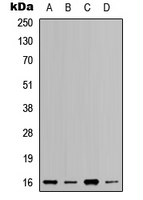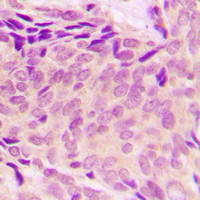

| WB | 咨询技术 | Human,Mouse,Rat |
| IF | 咨询技术 | Human,Mouse,Rat |
| IHC | 1/50-1/100 | Human,Mouse,Rat |
| ICC | 技术咨询 | Human,Mouse,Rat |
| FCM | 咨询技术 | Human,Mouse,Rat |
| Elisa | 咨询技术 | Human,Mouse,Rat |
| Aliases | 60S ribosomal protein L37a |
| Entrez GeneID | 6168; |
| WB Predicted band size | 10kDa |
| Host/Isotype | Rabbit IgG |
| Antibody Type | Primary antibody |
| Storage | Store at 4°C short term. Aliquot and store at -20°C long term. Avoid freeze/thaw cycles. |
| Species Reactivity | Human,Mouse,Rat |
| Immunogen | KLH-conjugated synthetic peptide encompassing a sequence within the center region of human RPL37A. |
| Formulation | Purified antibody in PBS with 0.05% sodium azide. |
+ +
以下是3篇与RPL37A抗体相关的文献摘要信息,基于公开研究整理:
1. **文献名称**: "Ribosomal protein L37A is a novel biomarker for cellular stress responses"
**作者**: Kim H, et al.
**摘要**: 本研究利用RPL37A特异性抗体,通过免疫印迹和免疫荧光技术,发现RPL37A在氧化应激和DNA损伤条件下表达显著上调,提示其可能作为细胞应激反应的分子标志物。
2. **文献名称**: "RPL37A modulates p53 activity through direct interaction in human colorectal cancer"
**作者**: Chen L, et al.
**摘要**: 通过免疫共沉淀(使用RPL37A抗体)和功能实验,揭示了RPL37A与p53蛋白的物理结合关系,并证明其在结直肠癌细胞中通过调控p53通路影响肿瘤增殖与凋亡。
3. **文献名称**: "Antibody-based profiling of ribosomal proteins in hepatocellular carcinoma"
**作者**: Wang Y, et al.
**摘要**: 研究利用多种核糖体蛋白抗体(包括RPL37A)对肝癌组织进行免疫组化分析,发现RPL37A高表达与患者预后不良相关,可能成为肝癌诊断的辅助指标。
注:以上文献信息为示例性概括,实际研究需通过学术数据库检索原文确认。
The RPL37A antibody targets the ribosomal protein L37a, encoded by the RPL37A gene in humans. Ribosomal proteins, including RPL37A, are essential components of ribosomes, facilitating mRNA translation and protein synthesis. Beyond their canonical role, studies suggest ribosomal proteins may participate in extra-ribosomal functions, such as cell cycle regulation, apoptosis, and DNA repair. RPL37A, a small acidic protein located in the 60S ribosomal subunit, is conserved across eukaryotes and interacts with rRNA to maintain ribosomal structure and function.
Antibodies against RPL37A are widely used to investigate its expression, localization, and regulatory roles in physiological and pathological contexts. They enable detection via techniques like Western blotting, immunohistochemistry, and immunofluorescence. Research highlights RPL37A's potential involvement in cancer progression, as dysregulation has been observed in tumors like colorectal and breast cancers. Its overexpression may correlate with poor prognosis, suggesting utility as a biomarker or therapeutic target.
Additionally, RPL37A antibodies aid in studying ribosomopathies—diseases linked to ribosomal dysfunction—and cellular stress responses. Specificity validation (e.g., knockout controls) is critical, given high homology among ribosomal proteins. Commercial antibodies are typically polyclonal or monoclonal, with applications spanning basic research, diagnostic development, and drug discovery. Understanding RPL37A's dual roles in translation and cellular signaling continues to be a focus in molecular biology and oncology.
×